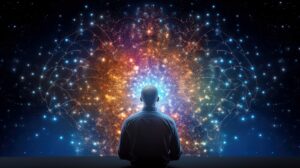|
To dream the impossible dream. To fight the unbeatable foe.
To bear with unbearable sorrow. To run where the brave dare not go.
To right the un-rightable wrong. To love, pure and chaste from afar.
To try when your arms are too weary to reach the unreachable star.
This is my quest! To follow that star! No matter how hopeless. No matter how far.
To fight for the right without question or pause.
To be willing to march into hell for a heavenly cause.
And I know if I’ll only be true to this glorious quest,
That my heart will lie peaceful and calm when I’m laid to my rest.
– Mitch Leigh (1928-2014) & Joe Darion (1917-2001), from “Man of La Mancha” (1965)
 The most inexplicable fact about the mainstream scientific community’s blind adherence to its “fundamental scientific dogma of materialism” is how utterly worthless that tattered old dogma actually is. Indeed, restricting scientists with any dogma whatsoever as they go about their work of attempting to better understand the reality that we inhabit can be of no value to those scientists and their work whatsoever. Wow, talk about tilting at windmills! No dogma can provide any useful information, or guardrails, or shortcuts, or even cautionary tales. Dogmas give scientists nothing that can be of value to their work, even on a minimal level. So why do modern research scientists seeking to understand consciousness still continue to allow themselves to be burdened by materialism, when it has been clear for more than a century to anyone with even a minimally open mind that whatever consciousness is, it has to be studied without any preconditions at all? And certainly, it makes no sense whatsoever to limit its study to just the human brain! So, why is that still happening? I have kind of an awful theory about that. But before I mention my theory, let’s first check in on the current state of the ongoing search for a source of consciousness inside the human brain. The most inexplicable fact about the mainstream scientific community’s blind adherence to its “fundamental scientific dogma of materialism” is how utterly worthless that tattered old dogma actually is. Indeed, restricting scientists with any dogma whatsoever as they go about their work of attempting to better understand the reality that we inhabit can be of no value to those scientists and their work whatsoever. Wow, talk about tilting at windmills! No dogma can provide any useful information, or guardrails, or shortcuts, or even cautionary tales. Dogmas give scientists nothing that can be of value to their work, even on a minimal level. So why do modern research scientists seeking to understand consciousness still continue to allow themselves to be burdened by materialism, when it has been clear for more than a century to anyone with even a minimally open mind that whatever consciousness is, it has to be studied without any preconditions at all? And certainly, it makes no sense whatsoever to limit its study to just the human brain! So, why is that still happening? I have kind of an awful theory about that. But before I mention my theory, let’s first check in on the current state of the ongoing search for a source of consciousness inside the human brain.
Back in 1998, premier neuroscientist Christof Koch had wagered prominent philosopher of mind David Chalmers a case of fine wine that within the next 25 years, a specific “signature of consciousness” would be found in the brain. Well, those twenty-five years were up this summer, and philosopher of mind David Chalmers handily won their bet. (When you click on the link, just scroll down and enjoy the video. And no, despite appearances, Dr. Chalmers has not of late become a homeless person.) And, gentleman of his word that he is, Dr. Koch has conceded that he has lost their 25-year-old bet, and in front of a packed theater he recently delivered to Dr. Chalmers six bottles of fine wine. He then doubled down on his failure and reactivated their bet, insisting that by twenty-five years from now, in the summer of 2048, when Dr. Koch will be a sprightly 92 years old, some scientist somewhere will indeed have figured out how the human brain generates consciousness. And Dr. Koch will then gladly claim that future, younger scientist’s victory as his own!
 But why is figuring out and better understanding consciousness so very hard for scientists, anyway? Well, for one thing, when they seek to define consciousness, they seem always to do it with reference to the human brain. And they continue to do this, even as we approach the fiftieth anniversary of Dr. Raymond Moody’s groundbreaking book, Life After Life, where Dr. Moody defined the term near-death experience. Since 1976, when that book first came out, there have been so many books and videos produced about near-death experiences, out-of-body experiences, remote viewing, and verifiable afterlife communications, all various proofs of the simple fact that human consciousness easily exists apart from the human brain. So at this point, to read about the feeble and primitive state of scientists’ understanding of consciousness can make you feel like tearing your hair out. Mainstream Western culture is full of all kinds of evidence of the simple fact that consciousness is a lot more complicated than just something that seems to arise and exist only inside our material heads. So for credentialed scientists to be still as willfully ignorant as so many of them insist on remaining, they have to be covering their eyes, sticking their fingers in their ears, dancing from foot to foot, and singing “La La La La!” continuously and loudly, all day and night! But why is figuring out and better understanding consciousness so very hard for scientists, anyway? Well, for one thing, when they seek to define consciousness, they seem always to do it with reference to the human brain. And they continue to do this, even as we approach the fiftieth anniversary of Dr. Raymond Moody’s groundbreaking book, Life After Life, where Dr. Moody defined the term near-death experience. Since 1976, when that book first came out, there have been so many books and videos produced about near-death experiences, out-of-body experiences, remote viewing, and verifiable afterlife communications, all various proofs of the simple fact that human consciousness easily exists apart from the human brain. So at this point, to read about the feeble and primitive state of scientists’ understanding of consciousness can make you feel like tearing your hair out. Mainstream Western culture is full of all kinds of evidence of the simple fact that consciousness is a lot more complicated than just something that seems to arise and exist only inside our material heads. So for credentialed scientists to be still as willfully ignorant as so many of them insist on remaining, they have to be covering their eyes, sticking their fingers in their ears, dancing from foot to foot, and singing “La La La La!” continuously and loudly, all day and night!
Believe it or not, the following amazing piece of retrograde nonsense was copied from a recent article in a reputable popular science magazine: “The orthodox scientific view today is that consciousness is a property of physical matter, an idea we might call physicalism or materialism. But this is by no means a universally held view, and even within physicalism there is little agreement about how consciousness emerges from, or otherwise relates to, physical stuff.” Wow. If you haven’t believed me when I have been telling you that the gatekeepers’ “fundamental scientific dogma of materialism” is still being enforced, perhaps you will believe me now!
 In fact, the scientific gatekeepers’ bent toward materialism is still being so rigorously enforced that there is as yet no universal scientific consensus about what consciousness even is. Wikipedia tells us that “Consciousness, at its simplest, is awareness of internal and external existence.” And “today, it often includes any kind of cognition, experience, feeling, or perception. It may be awareness, awareness of awareness, or self-awareness, either continuously changing or not. The disparate range of research, notions and speculations raises a curiosity about whether the right questions are being asked.” In fact, the scientific gatekeepers’ bent toward materialism is still being so rigorously enforced that there is as yet no universal scientific consensus about what consciousness even is. Wikipedia tells us that “Consciousness, at its simplest, is awareness of internal and external existence.” And “today, it often includes any kind of cognition, experience, feeling, or perception. It may be awareness, awareness of awareness, or self-awareness, either continuously changing or not. The disparate range of research, notions and speculations raises a curiosity about whether the right questions are being asked.”
That last sentence, not italicized in the original, seems to me to be the most crucial point! It seems obvious by now that in fact scientists are not asking the right questions, and moreover they are making what amount to nonsensical assumptions when they discuss and attempt to investigate consciousness. The first and foremost question to be asked and answered as soon as possible is whether the human brain produces consciousness, or whether the brain instead receives consciousness, much as a radio receives a transmitted signal. Given all the very good evidence produced in the past fifty years that an individual human being’s consciousness can function apart from its associated brain, this is an absolutely key question that must be asked by the scientific community, and investigated insofar as that is possible, before very much more research money is spent! And yet, insofar as I can tell, nowhere in the mainstream scientific community has this question ever been asked by anyone.
 The fact that mainstream science is putting its time, money, energy, and effort into doing research that is all based on the assumption that the human brain produces consciousness is a triumph of hopeless hope in a failed dogma over basic common sense. Let’s look at just four randomly-chosen current articles in popular science magazines about research projects in the area of consciousness: The fact that mainstream science is putting its time, money, energy, and effort into doing research that is all based on the assumption that the human brain produces consciousness is a triumph of hopeless hope in a failed dogma over basic common sense. Let’s look at just four randomly-chosen current articles in popular science magazines about research projects in the area of consciousness:
*· The Mind-Body Connection. Here, in an article dated in May of this year, some scientist argues that the reason why we haven’t found the source of our conscious experiences in our brains alone is that our hearts and guts must also play a role. He is insisting now that generating who we are must be a whole-body project. Yes! That’s the ticket!
*· Consciousness Must be an Emergent Phenomenon. Just as in physics, for example, some materials exhibit superconductivity in volume, where large numbers of electrons together can move without resistance in ways that one electron or a few cannot, and yet it isn’t always clear why; so some neuroscientists now believe that consciousness seems to emerge from some collective behavior of many neurons working together. More nonsense.
·* Consciousness is Either More or Less Than Sentience. In a confusing article published in November of 2022, a psychologist argues that the phenomenon of children born with hydranencephaly, which is a condition where the brain’s cerebral hemispheres are mostly absent and replaced by sacs filled with cerebrospinal fluid while these children can nevertheless still function, may imply that consciousness is lodged in the brain stem. Or maybe not.
* Wakefulness Can be Traced to Specific Clusters of Nerve Cells in the Brain. In what is a relatively modest article published in August of 2023, researchers at Harvard Medical School have mapped how 18 clusters of neurons that were previously found to underlie wakefulness in the brains of mice, rats, and cats also connect to each other in deep regions of the human brain.
 I chose these articles at random. They were just the four that were recommended below one of the articles that I was copying about Dr. Koch’s and Dr. Chalmers’s 25-year-old bet, and I copied them as well, with the thought that they might be useful later. The fact that they seem so pathetic when we set them out and look at them together was not my deliberate plan! But the fact is that consciousness research at this point is just this modest and just this aimless. Scientists being funded to do consciousness research have got to assume that consciousness arises in the brain somehow, and that it is a product of matter, although they have no idea how that might happen. They do, however, have families to feed, and their only safe option in doing consciousness research at this point is to limit themselves to studying the matter of the brain. As I quoted above from a recent popular science magazine article, “The orthodox scientific view today is that consciousness is a property of physical matter, an idea we might call physicalism or materialism.” So if you are a working research scientist doing consciousness research, you have no option under current rules but to come up with some probably pointless and dead-end idea like one of the four cited above. Your job in fact is just to find some materialist way to run out your entire career-clock. I chose these articles at random. They were just the four that were recommended below one of the articles that I was copying about Dr. Koch’s and Dr. Chalmers’s 25-year-old bet, and I copied them as well, with the thought that they might be useful later. The fact that they seem so pathetic when we set them out and look at them together was not my deliberate plan! But the fact is that consciousness research at this point is just this modest and just this aimless. Scientists being funded to do consciousness research have got to assume that consciousness arises in the brain somehow, and that it is a product of matter, although they have no idea how that might happen. They do, however, have families to feed, and their only safe option in doing consciousness research at this point is to limit themselves to studying the matter of the brain. As I quoted above from a recent popular science magazine article, “The orthodox scientific view today is that consciousness is a property of physical matter, an idea we might call physicalism or materialism.” So if you are a working research scientist doing consciousness research, you have no option under current rules but to come up with some probably pointless and dead-end idea like one of the four cited above. Your job in fact is just to find some materialist way to run out your entire career-clock.
And my suspicion is that it is mainly for the sake of four generations of research scientists since the early twentieth century whose careers have been sacrificed on the altar of materialism that the scientific gatekeepers are so reluctant to make any changes now. And I get that. It is hard to admit that they and their predecessors were wrong for so long, and they guided so many scientists so far astray! But how can they possibly justify their continuing to hold fast to materialism, when it has been proven at this point to be such an obvious dead-end? How many more scientific careers are they going to pointlessly waste?
 Christof Koch might as well buy his next case of fine wine now and expect to turn it over in 2048, because he is again going to lose his bet. We afterlife researchers will wait for mainstream scientists to open-mindedly do the research before we proclaim this definitively, but we think now that the evidence is pretty strong that Max Planck was right. Consciousness is primary, and it pre-exists matter. Consciousness is both the sculptor and the clay, and in fact we are confident now that nothing else but consciousness exists. And for so long as the scientific gatekeepers continue to treat science, which should be an open-minded search for the truth, as nothing more than an insiders’ battle that they have long been waging with religionist insiders, then all of humankind will continue to be the ultimate losers here. But once the scientific gatekeepers free research scientists to think, and to question, and to learn, and to grow, then at last our future as an intelligent and fully productive species can begin! Christof Koch might as well buy his next case of fine wine now and expect to turn it over in 2048, because he is again going to lose his bet. We afterlife researchers will wait for mainstream scientists to open-mindedly do the research before we proclaim this definitively, but we think now that the evidence is pretty strong that Max Planck was right. Consciousness is primary, and it pre-exists matter. Consciousness is both the sculptor and the clay, and in fact we are confident now that nothing else but consciousness exists. And for so long as the scientific gatekeepers continue to treat science, which should be an open-minded search for the truth, as nothing more than an insiders’ battle that they have long been waging with religionist insiders, then all of humankind will continue to be the ultimate losers here. But once the scientific gatekeepers free research scientists to think, and to question, and to learn, and to grow, then at last our future as an intelligent and fully productive species can begin!
|
Roberta,
Is it possible that while they may be unconscious of it, these people are the “pokers”’more or less, to light a fire under us “non scientific” people to seek answers on our own? To teach us of our own sovereignty and consciousness? Do they not realize such large groups of people are hungrily seeking truth and not from them? Look how popular paranormal shows and videos are. I’m sure they’re aware, but why the refusal to investigate? Are they maybe looking for avenues of control?
Oh my dear Fran, I really do hope you’re right! I do wish that there were any positive purpose to their behavior, but I have trouble seeing it, myself.
https://pimvanlommel.nl/en/
When I started to get serious about studying the NDFE and OBE and wrote my first paper, still a somewhat skeptical materialist, I shared my paper with Dr. van Lommel. He was gracious and pointed me to the literature on validated OBEs, as is now well documented by Rivus, et., al. in The Self Does Not Die: Verified Paranormal Phenomena from Near-Death Experiences. He is not only learned, he is also a great human being, a kindly soul. It does aggreate him that the materialist community stubbornley refuses to recognize authenticated paranormal activitis, such as the OBE and remote viewing, as Roberta mentioned. HIs book attempts to relate consciousness to physics, but with recognition that conciousness provides the foundation for existence, not materialism; his book is a great read, too.
Oh my dear Adrian, thank you for this – what a perfect addition to our discussion here – Pim Van Lommel is brilliant!
I do enjoy your posts, even though I’m not that bright in science either. But I’ll just keep reading what you send and keep enjoying it. I’m also reading your books now and love them.
Dear Amy, it is lovely to see you here! And my goodness, if you aren’t bright in science, my dear, then you are in good company – my own children think I know nothing about science and I shouldn’t be writing about it, so please don’t hesitate to join the discussion!
I want to know which book explains how you first met your spirit guide and why don’t we all get to meet ours?
Dear Amy, I don’t know that I talk in any book about how I first met Thomas, but he broke the usual spirit guide code and came out to me through a medium to ask me to write Liberating Jesus. We have talked here about how to communicate with your spirit guide, but not lately, and it probably is time for us to do that again – good suggestion!
The physical science emerged from academic depts initially based in philosophy. When physics left the philosphy dept, it was keen to base itself on observation, termed Operationalism– if an idea about any aspect of reality could not be framed to permit observation defining its existence, then it was barred, i.e., the crucial test was observation and measurement.
The famous long runningf debate between Einstein and Bohr concerned Bohr and Heisenberg’s insistence that subatomic particles cound not be defined to possess a definite, real existence, because they were not then directly observable (I have published a paper reviewing experiments employing “weak” particle measurement (the energy of measurement is too weak to alter the state of the subatomic particles, but yet reflects their definite existence, thus validating Einstein’s perspective). Because of the Bohr/Heisenberg mistake, quantum mechanics assumes that unobserved particles have a nebulous existence termed the “superposition” state in which any given particle occupies all possible states at the same time; this mistake is what led to the many worlds theory in which existence is rapidly creating many more existences, only all but one being visible to us–a really crazy idea.
My dear Jack, I think this is part of why my son was telling me that I don’t know anything about science the other night over dinner. Seriously. He thinks I shouldn’t be blogging about it. But he can’t justify the materialist dogma, which he insists is beside the point, and we are about to add science to politics on our list of taboo dinner topics!
Dear Roberta, Although your formal education was not in science, as an attorney you were trained (and qualified) to read widely diverse areas of knowledge, sorting fact from fiction. I have yet to find a single error in what you have written about material science.
However, whenever materialists discuss the topic of cousciousness, they invariably display ignorance of a rich literature, as Efrem mentioned below, and an arrogance that they are the temple guardians of truth.
Oh my dear wonderful Jack, thank you so much for saying this! I do try hard to careful and scientific (as it were) in doing this work, but my goodness, materialists, are so defensive! And that in itself does tell us something, doesn’t it?
I was listening to Bonhoffer on the main enemy of progress
— stupidity.
Stupidity is a choice to feel safe within a separate body.
It’s the difference between jumping into a swimming pool
and jumping into the ocean!
Stupidity promises a closed system–no more and more on and on..
Stupidity insists we are separate beings to avoid the reality
of Consciousness swishing thru all of us!
What an invasion of privacy! Yikes!
The truth we are part of a whole vast vibrating buzz is too
scary.
And that God does see and record everything.
What amazes me is I am not unhinged by the Truth.
It has settled in me quite comfortably.
Mark Twain may have said (some dispute it):
“No amount of evidence will ever persuade an idiot”.
Oh my dear beautiful Erica, I do love our wonderful Dr. Bonhoeffer! He had been martyred just before I studied him in college, and he was so much my hero then. He still is today!
when I was studying philosophy we had an interesting module on Descartes the French philosopher who long ago argued that the brain and consciousness are completely separate. He introduced the interesting idea of dualism..
Yes, dear Lynn, so much to study and to learn, so many possibilities if you don’t limit your mind!
Dearest Roberta and everyone,
What continues to confound me, is that I can independently research out-of-body phenomena and find more answers and evidentials than the much lauded, respected scientific community. As science does not acknowledge OBEs, nor looks into mediumship records and experiments, Lil’ ol’ me can get to know more about consciousness than they can. That’s crazy when you think about it… Even remote viewing experiments – which are quite outstanding in themselves – are not of interest to mainstream science.
So – I can only deduce that there is something very wrong in the human perception that allows such gross oversight to exist and to be perpetuated. What flaw in human logic persists? What undoes us, we Homo Sapiens Sapiens, every time?
Sadly, our mind is more about the ‘ego protection state’ than truth. We have confirmation bias that enlarges an idea that agrees with our core beliefs and diminishes ideas which are against our closely-held beliefs. We hold life long dogma and we fear ideas that erode it. So we attack and belittle the opposing ideas.. We throw them out because we fear the ‘reality’ we have created in our minds will be toppled, and we will be left with nothing.
Also, we straight-out block ideas that challenge our dogma’s foundations. This goes well beyond diminishing an uncomfortable concept; it is full and outright denial. Many people just block even the basic concept of life after death. They don’t even rationalize it down point by point, they just reject it without thinking.
As my brilliant science teacher in year 10 put it to me, when I asked him to view certain police footage from the Enfield Hauntings in London in the 1970s:
“ If I look at this stuff and find I have to consider it, my whole perception of reality will shattered. And I’m not going to risk that happening.”
BTW: The footage featured kitchen chairs levitating. It was taken by the police during their home visit to the troubled Green St house in Enfield, London. Of course there was further footage of children ‘lifted’ into mid air; all this is on the public record…
Indeed the teacher’s comment to sixteen year old me was quite surprising. It’s funny what teachers will admit to students sometimes.. 😅
Ah yes, my dear Efrem, I am quite familiar with the willful blindness of scientists! I am just surprised that one of them was willing to state his truth to a child so frankly. Generally if they are confronted, they will just be insulting and dismissive, as if we are the idiots. But it doesn’t even need to be something so hard to believe as levitating chairs or children! The overwhelming evidence that exists of live after death, of long-distance viewing, of so much overwhelming evidence of the primacy of consciousness is all around them. At this point, they have to be willfully blind not to see it! But still, they refuse to see it. Or if confronted with it, they respond with something like your childhood science teacher’s answer, even to this day.
Dear Efram, I do believe the problem is cultural, not any lack of logic. Science emerged from the universities from philosophy depts, and professors were motivated to establish that their research and theories were rooted in an empirical reality that could be observed, and with experimental reslts that could be replicted. Paranormal research deals with phenomena that are difficult to justify by reference to repliocable causal mechanisms. Although there is a modest ability to produce paranormal results from meditation, and even drugs, the results are typically reports by individuals or personal perceptions, i.e., what’s in mind and thus not directly observable.
By the way, with the proliferation of cameras on cell phones, a great numbe of videos are being taken of phenomena that defy any materialistic explanation, and many videos make to to poipular tv programs–but there is a problem with the ability for computersd to create fake imagery.
The main problem remains with the culture of materialism in academia, with scorn aimed at any professors who take immaterial, paranormal phenomena seriously.
Dear Jack,
You make a great point about the “culture of materialism in academia.”
I realize that it is soo hard to effect cultural change and it often takes a big shock, or incremental generational change…
And yes, you talk of ‘scorn’ leveled at academics who take paranormal phenomena seriously. Scorn, or reducing someone to a less-than state through sharp criticism and derision, has been with us through the ages. There is hardly a better method of silencing someone.
The shun culture, the process of exile or removal from the group, is perceived akin to physical pain by the brain, I have heard. Such is the nature of things. 🙏🏼😣
Oh yes, my dear Jack, indeed it is cultural! And since that is the case, I have come to imagine that a point may come when the cultural winds will begin to blow dramatically differently once again. You lived through the Sixties, as I did, and it was astounding to see how rapidly the whole U.S. culture changed from the Fifties through the Sixties and then the Seventies to land in the relative stability of the Eighties. Anyone with a memory of having lived through that series of dramatic changes believes that just about anything is possible!